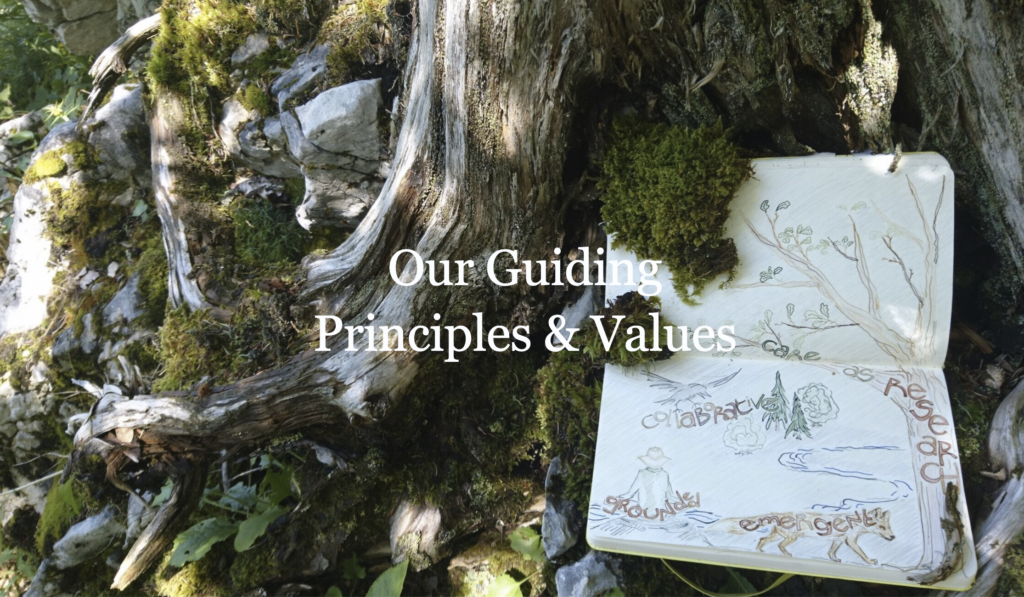
In weekly meetings with Willeke Rietdijk, Mary Rees, Enrico Fucci, Alma Maria Simon, Maor Rosenberg and Frank Schumann (and others), we sit and exchange together around the topic of ‘Enactive Research‘ – what is that? In our words, it is any professional practice that connects us to our lived sense of what matters, and where. How can we get there? Anyone interested in exploring the reality of this question is welcome! Read more about our thoughts about this, below.
As a group, we have been meeting in different constellations over the past 3-4 years, and when I think about how or why we meet, the central element I see is to practice listening and opening together, to develop a kind of social courage to attend to what is unfolding.
We have also formulated guiding principles together:
§ 1 ~ focus and grounding (to relax conditioning, to enter a receptive state, to stay oriented, to not corrupt yourself);
- listening to self: to regularly check in with experience. to learn to remember to pay attention. to prioritise moving into the right direction (rather than moving fast)
- embodiment: to practice (embody) what we preach. to express what we experience (as a body/human)
- experiment: to try on structures instead of blindly falling for or adhering to them
- slowness and reflexivity: to reflect and support each other to look again (instead of blindly following our assumptions); to resonate with questions (instead of answering them)
- small steps: to dream big and trust our vision, to challenge each other to try / play it out for real. to come up with concrete steps. where are we, what is needed now? where do we go from here? process AND outcome
§ 2 ~ emergent knowing (to sense or lean into interdepencence / what happens between us/environment);
- listening with other: to learn from each other’s ongoing sense-making. to connect to experience, particularly in difficult situations. to notice (take the time to intuit beyond) fear and judgment.
- generosity: to be kind to yourselves and others. to acknowledge that which supports us. to breathe with the courage to focus on resource and possibility.
- meeting on an inner plane: to share from and make proposals based on our ongoing lived experience.
- respect: to expect to be met as equals. to protect what is essential and help others do the same.
- play in not-knowing: to follow your curiosity, to trust your sensitivity and discover unexpected competence in self and other.
§ 3 ~ emergent response (to enact, co-create, become response-able from here, together); and
- personal leadership: to perform tasks and take on roles as people, alive, in contexts.
- co-facilitation: to carry responsibilities as pairs and teams. to make joint decisions. to face challenges together.
- creative resource and synergy: to map out relevant / ongoing tasks and contexts for everybody to see and explore together; to explore and evolve the skills, tools and structures we need to take a participatory approach.
- sharing: to invite others into active roles. to make available what we learn.
§ 4 ~ research (or more generally professional activity) as a particular practice of care and curiosity for enactive dynamics across system levels.
- personal and embodied: to realise that dreaming a better world is dreaming [as/of/towards] a more whole self (and team). to do research (work) that is integral to who we are, that develops wisdom of/from the body. how can we listen more / differently? how can we expand our movement repertoire?
- learning in relation / learning about relating: to do research in connection with real others, their diverse concrete needs, abilities and situation. to expose ourselves and our work to real contexts.
- implementation: to be pragmatic. to tap into and expand the possibilities that grow next to our path(s). to build sustainable research/work trajectories
- intervention and practice: to do research/work that nurtures and makes things better (in itself, through its process – not only through hypothetical outcomes). active participation and routine/habitat-building are key.
More recently, we formulated three priorities or goals that we share:
# 1 ~ to stay grounded in the body when we speak, act and interact (to stay in contact with emerging experience);
# 2 – to focus on the concrete context of relations within which our work/life unfolds – to invite participation, application, relationship;
# 3 – to explore research (or again, more generally professional activity) as a vehicle to keep on “loosening the grip” on what we perceive (in Claire Petitmengin’s words, “relaxing the gaze”, also referencing épochè): in our everyday work life, which methods and skills do we need to meet others in an ever evolving relationship (rather than as fixed and separate, problematic or useful, entities)?
We see these three goals as strong common ground and a useful frame for our future work. If you find yourself interested in them, that is a good indicator that you will enjoy (and inspire) our meetings and relationship as a group.
Because we care about grounding, relationality and emergence, we meet with a certain slowness, especially in the beginning of our meetings. Essentially we want to keep this attention – a noticing quality that connects us to what is happening in ourselves and others – during our exchange. That way we try to ‘use’ (honour) our relationship as a way of learning and taking responsibility for who and how we are in the world. That being said, this clarity about what we care about (principles, goals…) also allows us to just spend time together and share what comes up spontaneously.
